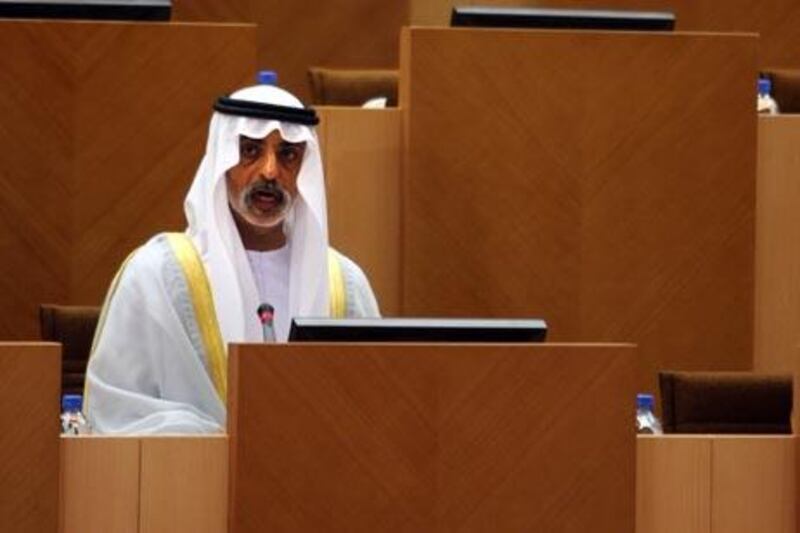ABU DHABI // Lack of funding is the root of all the problems of the Higher Colleges of Technology, FNC members were told yesterday.
Sheikh Nahyan bin Mubarak, the Minister of Higher Education and Scientific Research, was responding to a report by the FNC's education, youth, media and culture committee on the HCT's policy. Sheikh Nahyan is also the chancellor of the HCT.
Thousands of students have been denied admission this year and thousands more will not be able to find a spot at the country's largest federal university over the next few years, the committee's report said.
"All these issues, the deficiencies in them go back to the fall in the budget allocated to the colleges," Sheikh Nahyan replied. "The budget has been constant since 2007 while the number of students has increased by more than 5,000."
The budget of the HCT has been frozen at Dh736 million since 2007. Actual costs reached Dh928 million, representing a Dh192 million budget shortfall in 2009.
Deficits have accumulated in the past few years, and have led to "delays in carrying out development projects, providing necessary programmes, in addition to halting infrastructure projects or expanding by creating new campuses in a lot of the nation's cities", the committee's report said.
It projected a decline in the number of students accepted by the HCT, often sought as a last resort for students seeking higher education.
A total of 6,162 students were rejected in 2010, more than five times the number in 2003. That number is set to increase to 7,345 in 2012, according to the report.
The HCT is finding it increasingly difficult to attract "exceptional" faculty members, who are being offered better deals elsewhere.
Emirati staff represent just 1.86 per cent of the HCT's faculty and management, 19 from about 1,200, a direct result of the funding crunch and the inability to offer attractive salaries and financial incentives to nationals. Long teaching hours, slow promotions and better work offers outside the HCT were also identified as problems.
The report said the university had been unable to fund much in the way of new facilities. Research grants made up just four per cent of the budget in 2009 and 2010.
The lack of courses in Arabic has affected national identity.
A directive issued by Sheikh Mansour bin Zayed, the Deputy Prime Minister and Minister of Presidential Affairs, instructed the HCT to accept all students who apply to the university and the Government would fund it based on the number of students on its roster. That new system has not been implemented.
"We hope to God that the Ministry of Finance in the immediate future transfers the budget based on that plan, and at that point the focus in the colleges will be on raising productivity, developing the curriculum and constant expansion in accepting students," Sheikh Nahyan said.
Dr Amal al Qubaisi, a member of the committee and representative from Abu Dhabi, said the ministry did not seem to understand the urgency of education funding.
A day earlier, she said that the funding problems were a threat to national security. Students who were turned away from the federal universities have to bear a significant financial burden at private universities, which is unconstitutional because nationals are guaranteed a free education. Those who turn away from higher education altogether were prone to "deviance" and radicalisation, she said.
Najla al Awadhi, a member of the committee from Dubai, said the colleges should try to promote the teaching profession through media campaigns. She said the profession had negative connotations, particularly among male Emiratis.
Salaries, housing and services ate up 83 per cent of the university's budget for 2010.
Specialised programmes in fields crucial to the marketplace, such as tourism, insurance, financial services, the oil and gas industry, nuclear energy and scientific research, were "rare".
The FNC voted for a number of proposals in the report that were also supported by Sheikh Nahyan. These include increasing the HCT's budget so it can accept more students and better support its faculty, and putting in place Emiratisation strategies for the university's staff.
The HCT is the country's biggest federal university, with 17 campuses around the UAE and approximately 4,000 graduates a year. The number of students has increased from about 200 in 1988 when the colleges were founded to almost 20,000 now.







